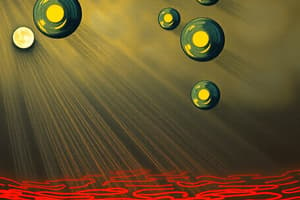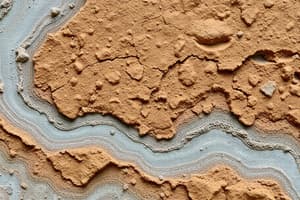Podcast
Questions and Answers
What is the process called where hotter material rises and cooler material sinks?
What is the process called where hotter material rises and cooler material sinks?
- Volcanism
- Plate Tectonics
- Convection (correct)
- Geodynamo
What is the habitat of life on Earth, which participates as an active component of the climate system?
What is the habitat of life on Earth, which participates as an active component of the climate system?
- Atmosphere
- Biosphere (correct)
- Hydrosphere
- Lithosphere
What is the barrier that forms in space beyond Earth's atmosphere, protecting the planet from highly energetic particles from the Sun?
What is the barrier that forms in space beyond Earth's atmosphere, protecting the planet from highly energetic particles from the Sun?
- Greenhouse Gases
- Magnetic Field (correct)
- Ozone Layer
- Atmospheric Pressure
What is the component of the Earth system that encompasses all parts of our planet and their interactions?
What is the component of the Earth system that encompasses all parts of our planet and their interactions?
What is the process that regulates the amount of CO2, CH4, and other greenhouse gases in the atmosphere, which in turn determines the planet's surface temperature?
What is the process that regulates the amount of CO2, CH4, and other greenhouse gases in the atmosphere, which in turn determines the planet's surface temperature?
What is the term that describes the collection of many open, interacting, and often overlapping geosystems?
What is the term that describes the collection of many open, interacting, and often overlapping geosystems?
What is the primary factor that drives volcanic eruptions and earthquakes?
What is the primary factor that drives volcanic eruptions and earthquakes?
Which of the following systems is responsible for global climate regulation?
Which of the following systems is responsible for global climate regulation?
What is the result of interactions within the Earth's interior?
What is the result of interactions within the Earth's interior?
What is the primary process by which the Earth's internal heat is transferred upward?
What is the primary process by which the Earth's internal heat is transferred upward?
What is the term for specialized subsystems that produce specific types of activity?
What is the term for specialized subsystems that produce specific types of activity?
What is the relationship between the shape of the landscape and the climate?
What is the relationship between the shape of the landscape and the climate?
What are the two main systems that control Earth processes?
What are the two main systems that control Earth processes?
What is the process that shapes the landscape?
What is the process that shapes the landscape?
What is the main difference in the distribution of iron and oxygen in the Earth's system?
What is the main difference in the distribution of iron and oxygen in the Earth's system?
What is the source of energy that drives the movement in the Earth's mantle and core?
What is the source of energy that drives the movement in the Earth's mantle and core?
What is responsible for Earth's climate and weather?
What is responsible for Earth's climate and weather?
What is the primary component of the Earth's crust?
What is the primary component of the Earth's crust?
What is the result of the Earth's internal heat engine driving movement in the mantle and core?
What is the result of the Earth's internal heat engine driving movement in the mantle and core?
What is the primary source of energy for the Earth's external heat engine?
What is the primary source of energy for the Earth's external heat engine?
What is the difference between the Earth's internal and external heat engines?
What is the difference between the Earth's internal and external heat engines?
What is the result of the Earth's external heat engine energizing the atmosphere and oceans?
What is the result of the Earth's external heat engine energizing the atmosphere and oceans?
Flashcards are hidden until you start studying
Study Notes
Earth's Internal Structure
- Earth's core is composed of iron, the densest element, with little silica, whereas the crust and mantle contain more silica and less iron.
- The inner core is solid, and the outer core is liquid.
Geosystems
- A geosystem is a collection of open, interacting, and often overlapping systems that make up the Earth system.
- Examples of geosystems include climate, mountain building, and convection.
Convection
- Convection is the process of hotter material rising and cooler material sinking, occurring in the Earth's interior.
- This process is driven by Earth's internal heat engine, powered by heat energy trapped in the deep interior during the planet's violent origin and released through radioactivity.
Earth's Magnetic Field
- The magnetic field is produced by the geodynamo, which is the swirling currents in the Earth's outer core.
- The magnetic field reaches outward into space, beyond Earth's atmosphere, and forms a barrier to highly energetic particles from the solar wind.
Interactions Among Geosystems
- The biosphere, the habitat of life, participates as an active component of the climate system, regulating greenhouse gases and surface temperature.
- Rain, wind, and ice erode mountains and shape the landscape, which in turn influences the climate.
Two Main Systems
- The climate system determines climate on a global scale and how climate changes over time.
- The Plate Tectonic System is responsible for Earth's dramatic geologic events, such as volcanic eruptions and earthquakes, driven by Earth's internal heat and the circulation of material in the mantle.
Earth's External Heat Engine
- Earth's external heat engine is driven by solar energy, which supplies heat to Earth's surface.
- The external heat engine energizes the atmosphere and oceans, responsible for Earth's climate and weather.
Studying That Suits You
Use AI to generate personalized quizzes and flashcards to suit your learning preferences.




